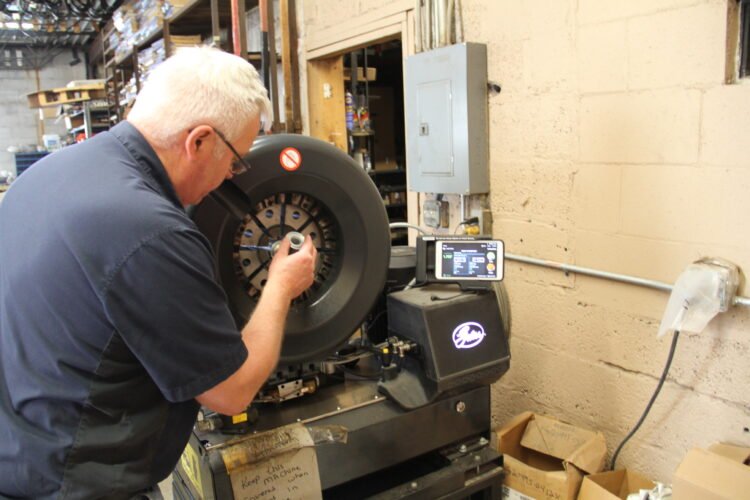[ad_1]

RR Brannstrom |Daily Press employee Pat Miller crimps a fitting onto the end of a hydraulic hose at Chatfield NAPA in Escanaba.
Editor’s note: The Daily Press is running a series of articles highlighting the history and uniqueness of local businesses. This series will run periodically in the Daily Press.
— — —
ESCANABA — Chatfield NAPA, Escanaba’s only locally owned auto parts store, began as a fabrication shop more than 120 years ago. Founded by Oliver Chatfield in 1903, the Chatfield Machine Company originally specialized in metal fabrication. The company still has a steel division that cuts parts to specifications, but over time retail auto parts sales have become a larger part of the business.
“Until 1976, there was a full-scale machine shop here.” “It was a great experience,” said Pat Miller, who started working at Chatfield in 1977 while still in high school. “In north central Michigan, it was the place to go. There was a lot of engine rebuilding and machine shop work. As a shop, it had more of an industrial feel.”
At the time, the store sold a lot of welding equipment, Miller said, and the company had a large trailer that made weekly trips to Milwaukee to get supplies like steel, oxygen and acetylene (welding gas).
Miller also recalled seeing relics from the business’s early days: Even when he worked there in the late 1970s, there were Model A and Model T parts lying around everywhere. Once, a customer came in with an old trailer from the 1930s, and then-owner Frank Shepek went upstairs to track down the parts, Miller reported.
“I heard they made logging trailers in the 1930s. They sold tractors… they did everything.” Miller said.
The Sheppek family purchased the business from Chatfield in the 1920s and ran it until 2006, when they sold the auto parts division to NAPA Corporation.
The business has evolved as needs and the industry have changed. Current owner Joshua King explained that there used to be a foundry on the premises dealing in brass and steel, but demand has changed. Instead of being somewhat generic and designed to last, the engines are now manufactured to a lower quality by third parties and aren’t built to be repaired. “Small engine machine shops are a thing of the past.” King said.
General Manager Nick Calio and Miller estimated that engine rebuilds dropped off significantly around 2000.
Dave Shepek continued to operate the steel plant until King purchased the building in 2015 and the store’s inventory from NAPA shortly thereafter.
The steel mill remains an important part of Chatfield, and even though the demand isn’t as high as it once was, people still rely on its services, including individuals and machine shops.
“For example, if a customer is repairing a trailer and needs to replace an angle bar, Jimmy will take (a sheet) off the rack and cut the piece that’s needed.” Calio said.
Another popular service is duplicating hydraulic hoses to fit farm equipment, logging trucks, excavators and other heavy machinery. Chatfield carries rolls of hose in various diameters, cuts them to size and uses a machine to crimp the necessary connections on both ends.
One thing that has changed in the automotive retail industry is how many versions of a given part there are. Years ago, one alternator would work on many different vehicles, but today, two vehicles of the same make and model may require different parts simply because one was manufactured six months before the other.
The store primarily carries NAPA parts, but because it’s locally owned rather than corporately owned, it’s able to stock a wider variety, which is an advantage, Calio said.
[ad_2]
Source link


